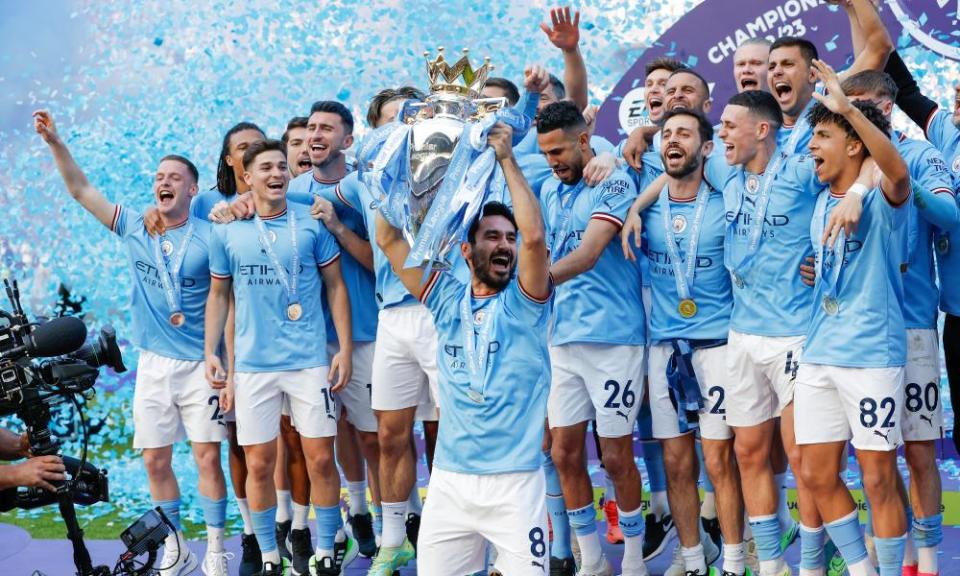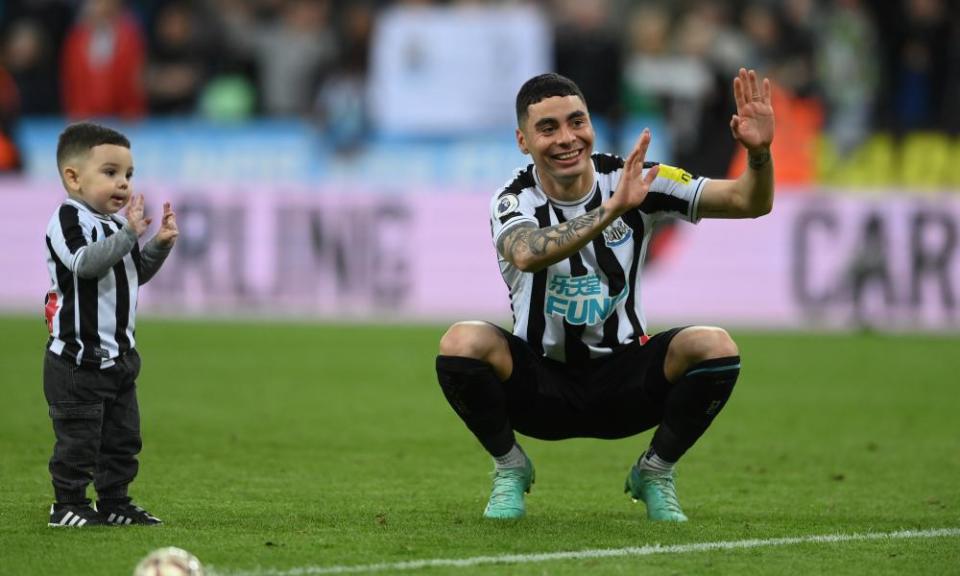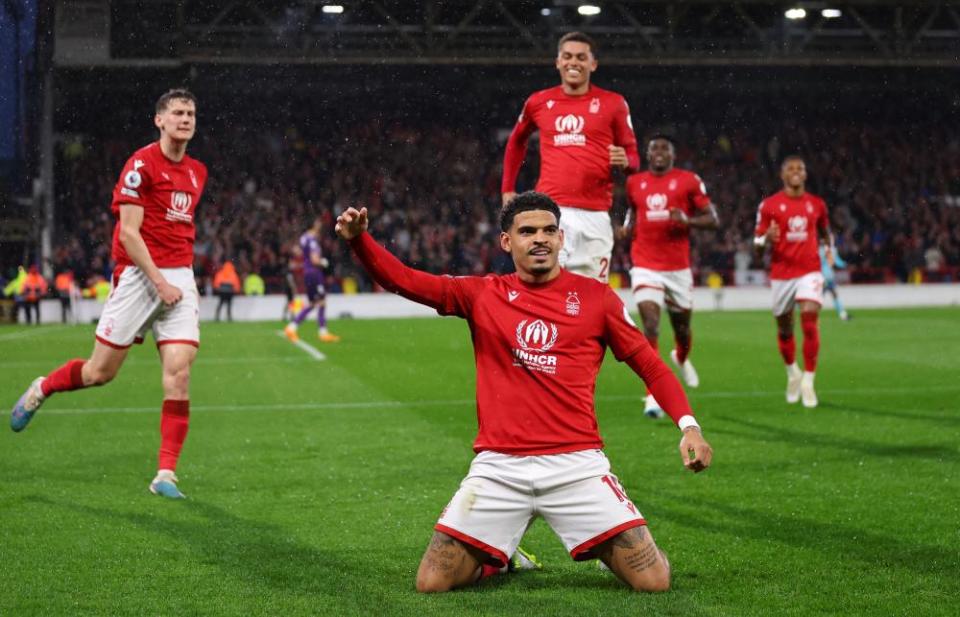Premier League 2022-23 season review: our predictions versus reality

Manchester City: predicted 1st, finished 1st
What we predicted: “Winning the Champions League is the focus for City, although anything less than top spot domestically will be a disappointment for a team aiming to set higher standards each season. Liverpool’s evolution and improvement will keep City on their toes and ensure there is, at the very least, a two-horse race for the title.”
What actually happened: Liverpool were nowhere to be seen in the title race and Arsenal faded in the run-in to give City their fifth title in six years. Despite a slow start in the Community Shield, when some pundits wondered if his arrival would prove a mistake, Erling Haaland’s goals gave the team a new dimension. A treble seems more likely than not.
Arsenal: predicted 5th, finished 2nd
What we predicted: “Last season, Arsenal promised so much before falling away in a manner that stung. Fifth place constituted significant progress but they should have held on to a top-four spot: a lack of depth, and arguably genuine quality, in key positions was an obvious reason and Mikel Arteta has spent his summer attempting to correct it. His efforts have gained rich reward. While it cannot be denied that Gabriel Jesus and Oleksandr Zinchenko were deemed expendable by Manchester City, spending around £75m for a pair of proven winners who are entering their peak years looks exceptional value in the current market.”
What actually happened: Arsenal promised so much before falling away in a manner that stung. They were in pole position to win the league, but a lack of depth and experience undid them in the end. It was a season of progress while also being one that may come to feel like a painful missed opportunity.
Manchester United: predicted 6th, finished 3rd
What we predicted: “After the poorest of campaigns, which ended with the team finishing sixth, 35 points behind Manchester City, it would be a minor miracle if Erik ten Hag takes Manchester United to fourth place.”
What actually happened: After a disastrous start – they lost their first two games of the season for the first time in 30 years – Manchester United did two things that transformed their season: they signed Casemiro from Real Madrid and they beat Liverpool at Old Trafford, giving them the steel and confidence to turn their campaign around. They are back in the Champions League, have won the League Cup and still have an FA Cup final to play – although plenty of their fans are dreading the prospect of losing to City at Wembley and watching their nearest rivals win a treble. United are on the up but the gap to Pep Guardiola’s side remains a chasm.
Newcastle: predicted 7th, finished 4th
What we predicted: “Under Eddie Howe’s intelligent management Newcastle were a team transformed during the second half of last season and there is no reason why they should not continue on that upward trajectory. Howe has been such a success at St James’ Park that Newcastle fans probably believe he is capable of walking on the river Tyne. Club executives shudder slightly when they recall that Unai Emery was their original first choice to replace Steve Bruce.”
What actually happened: Newcastle exceeded expectations and qualified for the Champions League for the first time in 20 years. They conceded just 33 goals in 38 league games – the joint lowest in the league with Manchester City – and also reached the final of the League Cup. Importantly, their top-four finish will help them attract more players this summer. Newcastle have joined the elite and look likely to stay there. Howe deserves plenty of praise – although Emery also knows how to take clubs into Europe.

Liverpool: predicted 2nd, finished 5th
What we predicted: “Liverpool are the best equipped team to deny Manchester City a hat-trick of Premier League titles. Dreams of an unprecedented quadruple evaporated in the final days of last season – serving as an extra incentive this time out – but Jürgen Klopp’s side are evolving nicely, with Luis Díaz and Ibrahima Konaté impressing in their debut campaigns. This summer’s business – signing Darwin Núñez before allowing Sadio Mané to leave, finally securing Mohamed Salah’s services for another three years, landing right-back cover in Calvin Ramsay then selling Neco Williams for four times that price – was a further demonstration of the well run operation at Anfield.”
What actually happened: Liverpool went 11 games unbeaten at the end of the season yet still missed out on a Champions League place, which shows just how inconsistent they were earlier in the campaign. Alisson was their best player. A number of factors contributed to their topsy-turvy form: a lack of investment in midfield, injuries at bad times, burnout from last season, a reliance on players who have aged together. Still, they can always look back and laugh about their 7-0 win against Manchester United.
Brighton: predicted 12th, finished 6th
What we predicted: “The mood on the south coast is understandably positive after last season’s record-breaking campaign under the shrewd Graham Potter, even if there could be some tinkering required at the Amex. Potter will know that finding a striker capable of scoring more than the nine goals top scorer Neal Maupay managed will be key to their chances.”
What actually happened: Potter left for Chelsea – where he was sacked after just six months – but Brighton continued to improve under his replacement, Roberto De Zerbi, and they are now preparing to play in Europe for the first time. They will lose more players this summer, notably Alexis Mac Allister – their top goalscorer this season – and Moisés Caicedo, but the future is tremendously bright on the south coast.
Aston Villa: predicted 10th, finished 7th
What we predicted: “There is no point masking it: Aston Villa intend to become a force and it does not take long in Steven Gerrard’s company to get a flavour of his desire to elevate the club up the table.”
What actually happened: Villa have become a force but not under Gerrard. He was sacked in October with the club hovering above the relegation zone. Unai Emery came in and revitalised the team, leading them to a seventh-placed finish and a spot in the Europa Conference League. Given Emery’s previous successes in continental football – he won the Europa League three times with Sevilla and once with Villarreal – Villa will be strong contenders.
Tottenham: predicted 3rd, finished 8th
What we predicted: “Daniel Levy has broken the habit of a lifetime and, in the process, helped to send optimism among the Tottenham support through the roof. The chairman normally likes to wait during the transfer window, hoping for bargains, but he moved early this summer, getting the bulk of the incoming business done by the middle of July. One person was particularly delighted by that and, if Antonio Conte is happy, so is everybody else.”
What actually happened: Conte was not delighted for long. In fact, no one has been happy at Tottenham this season. They have missed out on European football for the first time in 13 years and may end up losing Harry Kane, who somehow scored 30 league goals this season. Despite breaking the habit of a lifetime, Levy is more unpopular than ever.

Brentford: predicted 16th, finished 9th
What we predicted: “Second-season syndrome? Brentford suffered a variant of it in their first. After storming through the opening weeks of their Premier League debut they slumped alarmingly to the extent that, had it not been for the transformative impact of Christian Eriksen, relegation would have loomed menacingly. It means they have experience of pulling themselves up by the bootstraps when opponents find them out and the signs are they may need to draw upon it.”
What actually happened: At no point did Brentford look like going down. They thrashed Manchester United 4-0 in August – an embarrassing day for Eriksen – and were mightily impressive throughout the season, finishing the campaign as the only side to beat Manchester City home and away. They will have to cope without Ivan Toney for the first half of next season but Thomas Frank seems to have the solutions to every problem they face.
Fulham: predicted 19th, finished 10th
What we predicted: “The promotion celebrations at Fulham were pretty muted and not just because fans’ genteel reputation precedes them. The club’s last two promotions to the Premier League were followed by immediate relegation, so finishing 17th or higher would be viewed as a resounding success.”
What actually happened: Fulham did not trouble the relegation zone all season and were a match for everyone. Their win over Chelsea was a special moment and their fans will be delighted that they finished higher in the table than their neighbours for the first time since 1983. They were comfortably the best of the three promoted teams.
Crystal Palace: predicted 11th, finished 11th
What we predicted: “There is now genuine optimism that Patrick Vieira can take the perennial mid-table finishers into uncharted territory following a promising first campaign at the helm with an exciting young squad. Remarkably, the Frenchman took only a few weeks to transform Palace from the dogged defensive side that hit opponents on the break under Roy Hodgson into a team that plays exciting, possession-based football and does not just rely on old talisman Wilfried Zaha.”
What actually happened: Vieira was sacked in March after a run of 12 games without a win that left Palace just three points above the relegation zone. Remarkably, Hodgson returned and took no time at all to transform Palace into a team that plays exciting football. It was a bizarre reversal in fortunes. Hodgson was in charge for the final 10 matches of the season and kept them up in some style.
Chelsea: predicted 4th, finished 12th
What we predicted: “Chelsea have not gone away. The recruitment overseen by Todd Boehly, the club’s new co-owner and interim sporting director, has been encouraging and there has been no sign of Chelsea curbing their spending. Raheem Sterling, who should make Thomas Tuchel’s attack far more incisive, is a solid buy and Kalidou Koulibably is an important signing in defence following the departures of Antonio Rüdiger and Andreas Christensen.”
What actually happened: It was a total disaster. The spending only created a bloated, chaotic squad and, on top of that, there was no continuity in the dugout. Tuchel was sacked and replaced by Graham Potter, who was sacked and replaced by Frank Lampard, who has now been replaced by Mauricio Pochettino. No one comes out of the season with any credit: not the managers, players or owners. In fairness, Thiago Silva did OK in defence and Tuchel went on to win the league title in Germany so he won’t be complaining.

Wolves: predicted 13th, finished 13th
What we predicted: “The club is attempting to bridge a gap to the top six. That can be a dangerous path to follow. Many a club has considered itself established then slipped down the cracks after failing to make that leap. Tenth place last season was below par, and only two points from the last seven games, goals hard to come by, has put pressure on Bruno Lage to start the new season well or face the consequences.”
What actually happened: They did not start the season well and Lage faced the consequences. It was a season of two halves for Wolves, who were bottom of the table on Christmas Day before rallying under Julen Lopetegui and escaping relegation with three games to spare. The players they signed in January proved important.
West Ham: predicted 8th, finished 14th
What we predicted: “The aim is to challenge for a place in the top four again. The question is whether West Ham have grown stale. They captured the imagination with their run to the Europa League semi-finals last season, but a small squad struggled to cope with the additional workload and David Moyes has spent the summer trying to add more quality in several positions.”
What actually happened: West Ham did not challenge for a place in the top four – they were happy enough with 14th by the end of the season – but they did capture the imagination with their run to the Europa Conference League final. Their league form, once safe, did not really matter. Their season is all about one game: the meeting with Fiorentina next Wednesday.
Bournemouth: predicted 20th, finished 15th
What we predicted: “When the fixture computer coughed up this season’s assignments, Bournemouth could be forgiven for feeling a little queasy. Runners-up in the Championship last season, there is little time to adapt, with trips to Manchester City and Liverpool in the first month, as well as a home date with Arsenal.”
What actually happened: The fixture list was not kind to Scott Parker but his lack of faith in his own team – he called them “ill-equipped” for the top flight – was his undoing. Parker was replaced by Gary O’Neil and he pulled off a stunning revival in their fortunes. Bournemouth were bottom of the table in early March but wins in April against Leeds, Southampton and Leicester – the three sides that went down – ensured they were safe long before the end of the season.
Nottingham Forest: predicted 15th, finished 16th
What we predicted: “The owners have big ambitions, especially after shelling out heftily on players over the summer, but the reality is that the Premier League is a huge jump for any club, regardless of investment levels. Evangelos Marinakis spoke of going for trophies after securing promotion but the club will, ultimately, be happy if they finish 17th.”
What actually happened: Forest had one ambition and they achieved it. Signing 30 players in two transfer windows is unconventional but it worked. They stuck by their manager and he pulled them through in the end.

Everton: predicted 14th, finished 17th
What we predicted: “Did an expensively assembled squad seriously underperform last season or has the rot set in following years of mis-management by the club’s hierarchy? It falls to Frank Lampard to demonstrate it was the former, while being the latest Everton manager to be constrained by the latter, in his first full campaign in charge.”
What actually happened: Lampard finished the season working with an expensively assembled squad that seriously underperformed, but not at Everton. He was sacked in January after a run of 10 games without a win. Sean Dyche improved results and a victory over Bournemouth on the last day kept them up, but Everton need some serious changes this summer. There are only so many times you can circle the plughole without falling in.
Leicester: predicted 9th, finished 18th
What we predicted: “After last year’s difficult season ended in an eighth-place finish, this is a huge campaign for Leicester. Do they re-emerge as a challenger for Europe or continue to fall back into the stress-free comfort of mid-table mediocrity? Remember, just a year ago – with largely the same squad and manager – they blew the chance to qualify for the Champions League on the last day.”
What actually happened: Leicester gave us the shock of the season and not in a good way. They were shockingly complacent and were duly relegated on the final day. Their fans would certainly take the stress-free comfort of mid-table mediocrity now.
Leeds: predicted 18th, finished 19th
What we predicted: “The hope at Elland Road is that the only way is up after scraping survival on the final day of last season. They have lost, arguably, their two best players in Kalvin Phillips and Raphinha but the money has been wisely reinvested in a new-looking squad. Ensuring there is greater depth to a side that struggled to cope with injuries was the focus over the summer because another season of square pegs in round holes when things get tough is unlikely to end well.”
What actually happened: Leeds went down with a whimper on the final day of the season, losing 4-1 at home to Spurs to a chorus of boos from their own fans. Their defence was shocking all season, conceding 78 goals – more than two per game and more than any other team in the division – and it cost them dearly.
Southampton: predicted 17th, finished 20th
What we predicted: “When Southampton are good, they are a top-half Premier League team. And when they are bad, they are relegation-grade fodder. Since Ralph Hasenhüttl pitched up in late 2018, the problem is that you never know which version you’re going to get. Unfortunately, that’s about the most exciting bit about being a Southampton fan right now.”
What actually happened: They were bad, really bad. They lost 66% of their games. It was bad under Hasenhüttl, terrible under Nathan “nothing against Welsh women” Jones, and it was not much better under Rubén Sellés. Perhaps a season out of the top flight will do them some good.

 Yahoo Sport
Yahoo Sport 





































